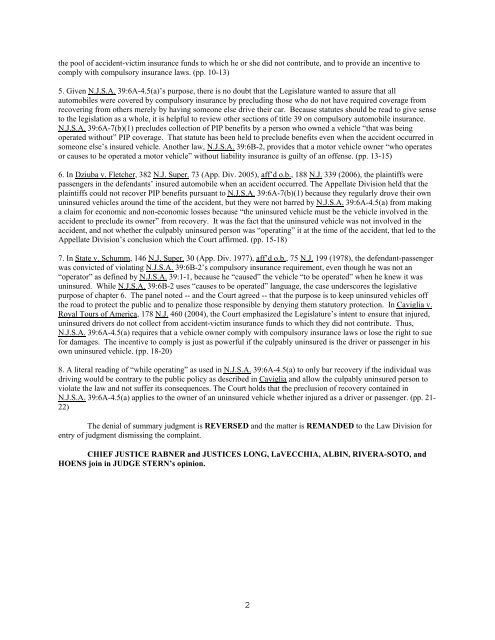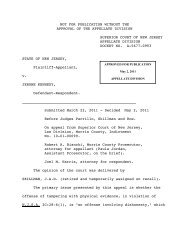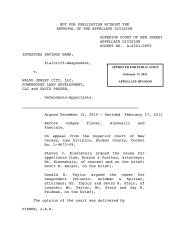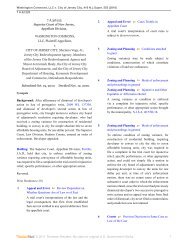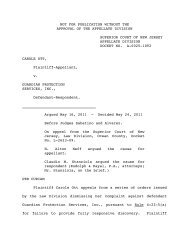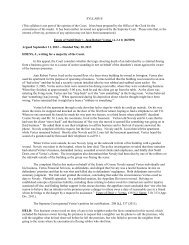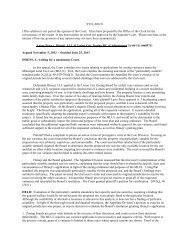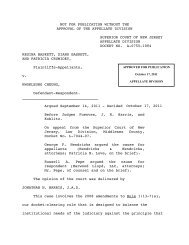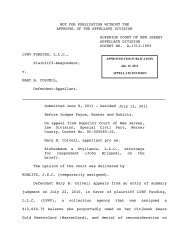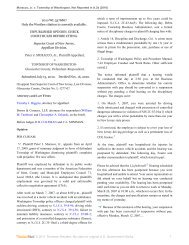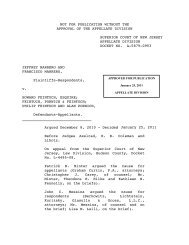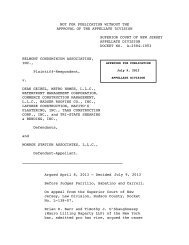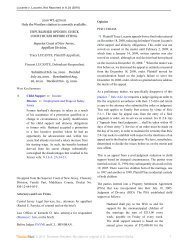Perrelli v. Pastorelle - Appellate Law NJ Blog
Perrelli v. Pastorelle - Appellate Law NJ Blog
Perrelli v. Pastorelle - Appellate Law NJ Blog
Create successful ePaper yourself
Turn your PDF publications into a flip-book with our unique Google optimized e-Paper software.
the pool of accident-victim insurance funds to which he or she did not contribute, and to provide an incentive to<br />
comply with compulsory insurance laws. (pp. 10-13)<br />
5. Given N.J.S.A. 39:6A-4.5(a)’s purpose, there is no doubt that the Legislature wanted to assure that all<br />
automobiles were covered by compulsory insurance by precluding those who do not have required coverage from<br />
recovering from others merely by having someone else drive their car. Because statutes should be read to give sense<br />
to the legislation as a whole, it is helpful to review other sections of title 39 on compulsory automobile insurance.<br />
N.J.S.A. 39:6A-7(b)(1) precludes collection of PIP benefits by a person who owned a vehicle “that was being<br />
operated without” PIP coverage. That statute has been held to preclude benefits even when the accident occurred in<br />
someone else’s insured vehicle. Another law, N.J.S.A. 39:6B-2, provides that a motor vehicle owner “who operates<br />
or causes to be operated a motor vehicle” without liability insurance is guilty of an offense. (pp. 13-15)<br />
6. In Dziuba v. Fletcher, 382 N.J. Super. 73 (App. Div. 2005), aff’d o.b., 188 N.J. 339 (2006), the plaintiffs were<br />
passengers in the defendants’ insured automobile when an accident occurred. The <strong>Appellate</strong> Division held that the<br />
plaintiffs could not recover PIP benefits pursuant to N.J.S.A. 39:6A-7(b)(1) because they regularly drove their own<br />
uninsured vehicles around the time of the accident, but they were not barred by N.J.S.A. 39:6A-4.5(a) from making<br />
a claim for economic and non-economic losses because “the uninsured vehicle must be the vehicle involved in the<br />
accident to preclude its owner” from recovery. It was the fact that the uninsured vehicle was not involved in the<br />
accident, and not whether the culpably uninsured person was “operating” it at the time of the accident, that led to the<br />
<strong>Appellate</strong> Division’s conclusion which the Court affirmed. (pp. 15-18)<br />
7. In State v. Schumm, 146 N.J. Super. 30 (App. Div. 1977), aff’d o.b., 75 N.J. 199 (1978), the defendant-passenger<br />
was convicted of violating N.J.S.A. 39:6B-2’s compulsory insurance requirement, even though he was not an<br />
“operator” as defined by N.J.S.A. 39:1-1, because he “caused” the vehicle “to be operated” when he knew it was<br />
uninsured. While N.J.S.A. 39:6B-2 uses “causes to be operated” language, the case underscores the legislative<br />
purpose of chapter 6. The panel noted -- and the Court agreed -- that the purpose is to keep uninsured vehicles off<br />
the road to protect the public and to penalize those responsible by denying them statutory protection. In Caviglia v.<br />
Royal Tours of America, 178 N.J. 460 (2004), the Court emphasized the Legislature’s intent to ensure that injured,<br />
uninsured drivers do not collect from accident-victim insurance funds to which they did not contribute. Thus,<br />
N.J.S.A. 39:6A-4.5(a) requires that a vehicle owner comply with compulsory insurance laws or lose the right to sue<br />
for damages. The incentive to comply is just as powerful if the culpably uninsured is the driver or passenger in his<br />
own uninsured vehicle. (pp. 18-20)<br />
8. A literal reading of “while operating” as used in N.J.S.A. 39:6A-4.5(a) to only bar recovery if the individual was<br />
driving would be contrary to the public policy as described in Caviglia and allow the culpably uninsured person to<br />
violate the law and not suffer its consequences. The Court holds that the preclusion of recovery contained in<br />
N.J.S.A. 39:6A-4.5(a) applies to the owner of an uninsured vehicle whether injured as a driver or passenger. (pp. 21-<br />
22)<br />
The denial of summary judgment is REVERSED and the matter is REMANDED to the <strong>Law</strong> Division for<br />
entry of judgment dismissing the complaint.<br />
CHIEF JUSTICE RABNER and JUSTICES LONG, LaVECCHIA, ALBIN, RIVERA-SOTO, and<br />
HOENS join in JUDGE STERN’s opinion.<br />
2


